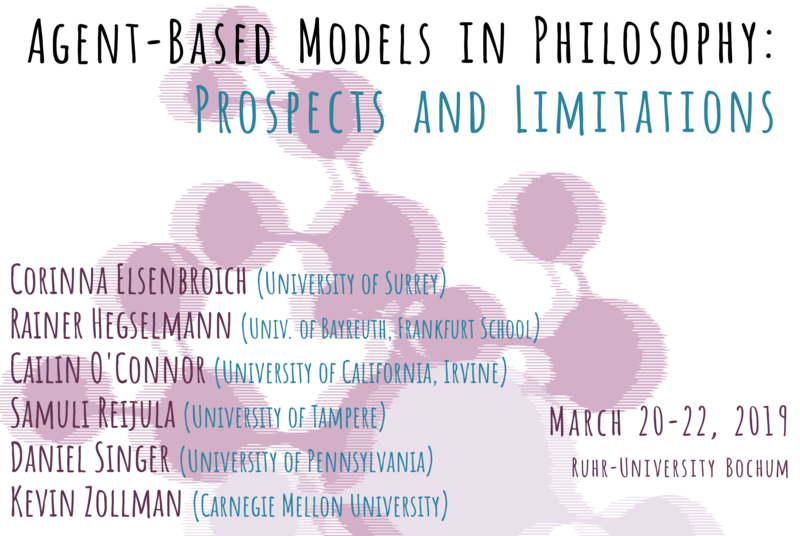Conference “Agent-Based Models in Philosophy – Prospects and Limitations”

- When
- March 20-22, 2019 (starting on March 20 in the afternoon)
- Where
- Institute for Philosophy II, Ruhr-University Bochum
- Call for submissions
- closed
The Conference Theme
Over the last decade agent-based models (ABMs) have become an increasingly popular method across philosophical disciplines: from ethics and political philosophy to philosophy of science and social epistemology. They have been used to investigate the evolution of social norms, the efficiency of scientific inquiry, opinion dynamics, networks of epistemic trust, argumentation strategies, etc. At the same time, a precise, widely agreed-upon methodology of agent-based modeling in philosophy is lacking. In fact, how ABMs should be constructed and used is controversially discussed in philosophy and beyond. While some argue that ABMs require empirical calibration, others emphasize the virtue of simplicity typical for abstract, highly idealized models. These issues have been closely related to a variety of epistemic functions ABMs are designed to perform: from providing normative generalizations to offering only ‘how-possibly’ explanations.
This conference provides a forum for discussing the proper role and the limits of ABMs proposed in the philosophical literature, novel application contexts of ABMs, as well as their relation to other philosophical methods (e.g., case studies, formal models of scientific inference, conceptual analysis). It aims to bring together experts with practical modeling expertise from social sciences and philosophy and scholars who engage in methodological reflections of this method.
This is the second edition of the conference series on Formal Models in Philosophy. For our 2017 conference see link.
Keynote speakers:
- Corinna Elsenbroich (University of Surrey)
- Rainer Hegselmann (University of Bayreuth, Frankfurt School of Finance & Management)
- Cailin O’Connor (University of California, Irvine)
- Samuli Reijula (University of Tampere)
- Daniel Singer (University of Pennsylvania)
- Kevin Zollman (Carnegie Mellon University)
Program Committee:
- Eckhart Arnold (Bavarian Academy of Sciences)
- Shahar Avin (University of Cambridge)
- AnneMarie Borg (Ruhr-University Bochum)
- Justin Bruner (University of Groningen)
- Patrick Grim (Stony Brook, University of Michigan)
- Johannes Marx (University of Bamberg)
- Conor Mayo-Wilson (University of Washington)
- Aydin Mohseni (UC Irvine)
- Ryan Muldoon (University of Pennsylvania)
- Rush Stewart (LMU Munich)
- Johanna Thoma (London School of Economics)
Organizers:
- Gregor Betz (Karlsruhe Institute of Technology)
- Dunja Šešelja (LMU Munich, Ruhr-University Bochum)
- Christian Straßer (Ruhr-University Bochum)
Conference Program
Click on the for a short abstract and on the title for a long one.
Wednesday, March 20, 2019
| 13:30 – 14:00 | Registration and opening |
| 14:00 – 15:15 | Rainer Hegselmann (Keynote talk): Computer-Aided Speculations in Social Epistemology: A Case Study on the Bounded Confidence Model Gregor Betz |
| 15:15 – 15:45 | |
| 15:45 – 16:45 | Contributed talks Dunja Šešelja |
| Dominik Klein, Johannes Marx and Simon Scheller: Some are just lucky - Questioning merit-based justifications of Inequality through ABM |
|
| Aydin Mohseni, Cailin O’Connor and Hannah Rubin: On the Emergence of Minority Disadvantage: Testing the Cultural Red King Hypothesis |
|
| 16:45 – 17:15 | |
| 17:15 – 18:30 | Kevin Zollman (Keynote talk): Scientific diversity and the theoretical virtues Christian Straßer |
Thursday, March 21, 2019
| 10:00 – 11:15 | Corinna Elsenbroich (Keynote talk): Treat Models “as a Means and Never as an End” Dunja Šešelja |
| 11:15 – 11:45 | |
| 11:45 – 13:15 | Contributed talks Simon Scheller |
| Bruce Edmonds: The Possible Evolution of Empirical ABMs |
|
| Vlasta Sikimić: The Case for Empirically Calibrated Agent-Based Models |
|
| Carlos Santana: Working with very little: what do we get out of neutral (agent-based) models? |
|
| 13:15 – 14:45 | Lunch break |
| 14:45 – 16:15 | Contributed talks Vlasta Sikimić |
| Christoph Merdes: Trapping Explanations and External Shocks |
|
| Audrey Harnagel: Toward a Theory of Mid-Level Agent-Based Modeling |
|
| Thomas Boyer-Kassem and Cyrille Imbert: In Praise of Contradiction: How to Help Groups Uncover What They Privately Believe |
|
| 16:15 – 16:45 | |
| 16:45 – 18:00 | Daniel Singer (Keynote talk): Agent-Based Models of Is and Ought Gregor Betz |
| 19:30 | Conference dinner in the restaurant Livingroom, Luisenstrasse 9-13 (https://www.livingroom-bochum.de/) |
Friday, March 22, 2019
| 10:00 – 11:15 | Cailin O’Connor (Keynote talk): Polarization and Factionization in Science Christian Straßer |
| 11:15 – 11:45 | |
| 11:45 – 13:15 | Contributed talks Aydin Mohseni |
| Simon Scheller: Why visible group characteristics matter for trust and how this may lead to out-group discrimination |
|
| Peer-Olaf Siebers: Community Modelling and Communication with PhiloLab |
|
| Jeremiah Lasquety-Reyes: Computer Simulations of Virtue Ethics: Simplicity versus Complexity |
|
| 13:15 – 14:45 | Lunch break |
| 14:45 – 16:15 | Contributed talks Gregor Betz |
| Momme von Sydow, Christoph Mertens and Ulrike Hahn: Belief-based Update of Epistemic Trust: A Disaster and Light at the End of the Tunnel |
|
| Marta Esteves and Rodrigo Nicolau Almeida: “Who is Bald?”: An Agent-Based Model Account of Vagueness |
|
| Annemarie Borg, Daniel Frey, Christian Straßer and Dunja Šešelja: Using Agent-Based Models to Examine Past Scientific Episodes: towards robust findings |
|
| 16:15 – 16:45 | |
| 16:45 – 18:00 | Samuli Reijula (Keynote talk): What has modeling taught us about cognitive diversity? Dunja Šešelja |
Venue and how to get there
The conference will take place at Beckmanns Hof (Tokio room), Ruhr-Universität Bochum, Germany.
From Bochum Hauptbahnhof (central station) take the U35 towards Bochum Querenburg (Hustadt) and get out at stop “Ruhr Universität”. (Ticket needed: Preisstufe A, €2,80). On weekdays the subway U35 leaves every 5 minutes and reaches the university within 9 minutes.
Getting from the U-Bahn stop “Ruhr Universität” to Beckmanns Hof
Beckmanns Hof is located on Campus behind the Mensa. A map of the campus can be found here: campus map.
From the train station of the U35 (“Ruhr-Universität”) go up the pedestrian bridge, turn right from the exit and walk towards the university. Your route takes you directly to the building of the university library. Keep walking till you pass the University library on your right, and continue until you reach the University “Mensa” building. Pass by the “Mensa” by walking down stairs, cross a campus street and a parking lot, and further walk down to the Beckmanns Hof.
Travel recommendations for long-distance and air travellers
Bochum Hauptbahnhof (central station) is served by ICE, IC, EC, regional and suburban trains at a high frequency. From there, you can reach the University easily by taking underground line U35 straight to the stop Ruhr-Universität. Four airports - Dortmund, Münster/Osnabrück, Cologne/Bonn and Düsseldorf - are within a reasonable distance of the Ruhr-Universität. Düsseldorf Airport, however, is not only the largest, but also the most easily accessed: there are direct connections between the airport and Bochum’s main train station up to eight times per hour, and the journey only takes a good half an hour.
Getting from Düsseldorf Airport to Bochum Hauptbahnhof
Upon arriving at the airport follow the signs to the DB (Deutsche Bahn) train station. Buy your train ticket to Bochum (Ticket needed: Preisstufe D, €15,70) at the airport before boarding the monorail which takes you to the train station. There are trains travelling directly to Bochum Hauptbahnhof frequently and the trip takes about 35 to 45 minutes depending on which train you take. The ticket Preisstufe D is a ticket provided by the public transportation system VRR and it is only valid in regional trains and S-Bahn. If you take an ICE, IC or EC you need a more expensive ticket for long-distant trains.
Getting from Dortmund Airport to Bochum Hauptbahnhof
Take the shuttle bus from the Airport Terminal to Holzwickede train station. From Holzwickede you take the train to Dortmund Hauptbahnhof (central station) and then change trains to Bochum Hauptbahnhof.
Accommodation
Since both the city centre and the conference venue are easy to reach from Bochum Central Station (Bochum Hauptbahnhof), we suggest booking an accommodation in that area.
Registration
In order to register for the conference, please fill out the registration form. There is no registration fee.
Call for Submissions (closed)
Closed.
For any questions, please contact us at: ABMphil2019@gmail.com.
The conference is funded by a Sofja Kovalevskaja award of the Alexander von Humboldt-Foundation, funded by the German Ministry for Education and Research.
